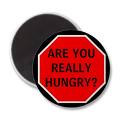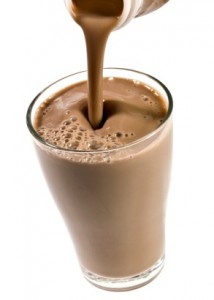Eating When You’re Not Hungry
 You’re now onto part 3 of my interview with nutrition expert and author of Eat Stop Eat, Brad Pilon. Over the past couple of days, Brad and I have been exposing dieting myths floating around out there which are inevitably leading to mixed fat loss results.
You’re now onto part 3 of my interview with nutrition expert and author of Eat Stop Eat, Brad Pilon. Over the past couple of days, Brad and I have been exposing dieting myths floating around out there which are inevitably leading to mixed fat loss results.
So, if you missed part 1 or 2, then you’ll want to head back and read up on those before jumping into today’s discussion – post workout nutrition and eating when you’re not hungry.
***********************
Craig Ballantyne: Okay. The next one is, “Don’t eat if you’re not hungry.”
So, this one sounds pretty straightforward, but then we also have people eating according to alarm clocks, setting it for two to three hours. So, what’s your opinion on that?
Brad Pilon: Eating shouldn’t be difficult.
You shouldn’t have to have an advanced degree in nutrition or physiology to figure out how to eat, which means that by and large you can go an extra hour or two without eating if it happens. So, if you’re stuck in traffic and your alarm goes off and you haven’t eaten in three hours, there’s absolutely no reason to panic.
I mean, really, the majority of us have never really felt hunger.
We’ve really wanted to eat, you know, we’ve badly been craving food, but hunger is a whole different thing. And what we experience is conditioned response, whether it’s through habit or just people we know or just marketing and conditioning, a CONDITIONED RESPONSE to want certain foods at certain times.
And a perfect example of that is – I think I’ve used this before, but I find it amusing that I can easily now fast for 24 hours. I mean, I can do it without even thinking about it. Like I said, I wanted to get out and get a favorite snack and I got my mind really into it, that I wanted to go and splurge and have, like, I don’t know, an Arby’s burger, since we’re talking about fast food, and I get there and it’s closed, it’s devastating, right, because I built up that expectation, I wanted food.
So, just eat when you’re hungry is a little difficult because it’s hard to tell when you’re actually hungry and when you just want to eat.
So, I think the whole point there is to relax about it a little bit and try to RELEARN, “Am I hungry?”, “Is it time for me to eat or am I just sort of jonesing for something because I’m going to the movies and I always get M&M’s,” I’m at the movies or something like that. You just have to sort of cheese out the habit from the true needing to eat and the right times.
But you certainly DO NOT have to make eating a chore or some sort of lesson of self-discipline where you’re eating  according to your watch. In terms of the time and effort you have in your life, that’s an unneeded waste of both time and effort that you could be using on something else.
according to your watch. In terms of the time and effort you have in your life, that’s an unneeded waste of both time and effort that you could be using on something else.
Craig Ballantyne: Yeah, and I think, like, even if someone didn’t wanna commit to doing the fasting every week, just to do one, two or three of them, it shows you what it’s like to feel hunger instead of, “Oh, you know, it’s been two hours since I ate, and I’m starving.” Well, you’re not starving after two hours.
It’s a very interesting learning experience. People will have a lot more control over when they think they’re hungry outside of these fasts, so I really, really think it’s a wonderful learning experience and so many people, obviously, on the turbulence training forums and site have agreed, so it’s been a very good program.
I guess one other thing that I didn’t put on that list that I sent you, Brad, was the forcing of sugar after training.
I mean, that’s not something that everyone can agree on for sure, but it’s kind of a related topic to what we’ve been talking about here, especially about what you said about forcing food and stuff like that. So, what’s the real deal with, 
“Should I have sugar in my post-workout drink?”
“Should I have a post-workout drink at all?”
“Should I focus on that?”
“If I wanna lose fat, should I be consuming 50 grams of dextrose?”
Brad Pilon: Right. So, the original idea came from the fact that up until probably the early ‘90s, the term exercise referred to running, biking, swimming, physical endurance-type workouts. And it was these people who looked at the need for carbohydrates after workout to refuel and to replenish their muscles, right.
And then as our generation came up and we viewed exercise as lifting stuff, right, we still liked the idea of refueling and replenishing our muscles only the difference is that it was a completely different type of exercise.
So, if you are a high level ENDURANCE athlete and you’re going to be training again very soon and fat loss is not your goal then, by all means, you should probably have some sort sugar solution after your workout, maybe a couple of hours after that, because you have to compete at a high level again maybe the next day or maybe even several hours later in the afternoon.
But for the rest of us who aren’t worried about the actual performance that we do in a long distance event or we’re trying to lose body fat by sort of burning of extra calories, it DOES NOT MAKE A LOT OF SENSE to replace the calories we just burned off.
The whole goal of putting yourself through that strenuous workout was to burn calories in the first place. And if you don’t really need them then now you’re adding sort of useless calories just for the sake that it feels right or, “Someone told me it was correct.”
And that’s the HARDEST PART with understanding nutrition, is figuring out – if you’re feeling guilty about something, like y ou should be eating because someone told you somewhere that eating right now is good, if you’re being driven to eat by guilt, it’s a good way to get a pretty good idea that you probably don’t have to eat then.
ou should be eating because someone told you somewhere that eating right now is good, if you’re being driven to eat by guilt, it’s a good way to get a pretty good idea that you probably don’t have to eat then.
So, after your workout, by all means, there’s nothing wrong with eating after your workout, you just have to pay attention to your goals and how you feel, too. I’ve known more than one body builder who just really can’t. After a workout, they’ve pushed themselves so hard that they can’t eat. Instead of freaking out about that, realize that it’s not that big of a deal, and, yeah, just relax about it, basically.
Craig Ballantyne: Very cool.